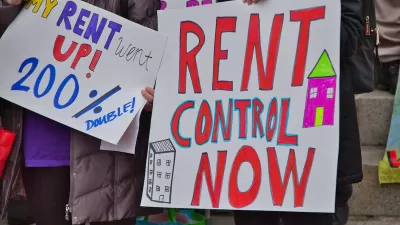Enacted in 2015, Berlin's "Mietpreisbremse" ordinance limits rent increases on some (but not all) apartments. According to this study, results have not been ideal.

"While there's broad agreement among economists that rent control is ineffective and even counterproductive, it still seems like a tempting and direct solution to the problem. What happens when a big city imposes rent control?"
Joe Cortright looks at a study on Berlin's attempt to tamp down rents. Like many U.S. cities, Germany's capital has seen rents rise lately. But in Berlin, a full 85 percent of households are rentals. That means a lot more support for pro-renter policies.
Called Mietpreisbremse (a "brake on rents"), "Berlin's rent control ordinance is a complex one: it's not a freeze on rents per se, but rather a limit on rent increases on existing rental units." Complex rules govern which apartments the law covers.
The policy hasn't been that successful. "The key finding of the Thomschke paper is that the initial enactment of the law has reduced rents in rent-controlled flats compared to those not included in the scheme, but the effects have been less than the law intended." In fact, the law tended to lower prices only on luxury apartments. That ironic result, Cortright says, is "a stark reminder that while posed as a way of promoting affordability for low income households, in practice, rent control may actually provide greater benefits for higher income renters."
FULL STORY: Does rent control work? Evidence from Berlin

Planetizen Federal Action Tracker
A weekly monitor of how Trump’s orders and actions are impacting planners and planning in America.

Maui's Vacation Rental Debate Turns Ugly
Verbal attacks, misinformation campaigns and fistfights plague a high-stakes debate to convert thousands of vacation rentals into long-term housing.

Restaurant Patios Were a Pandemic Win — Why Were They so Hard to Keep?
Social distancing requirements and changes in travel patterns prompted cities to pilot new uses for street and sidewalk space. Then it got complicated.

In California Battle of Housing vs. Environment, Housing Just Won
A new state law significantly limits the power of CEQA, an environmental review law that served as a powerful tool for blocking new development.

Boulder Eliminates Parking Minimums Citywide
Officials estimate the cost of building a single underground parking space at up to $100,000.

Orange County, Florida Adopts Largest US “Sprawl Repair” Code
The ‘Orange Code’ seeks to rectify decades of sprawl-inducing, car-oriented development.
Urban Design for Planners 1: Software Tools
This six-course series explores essential urban design concepts using open source software and equips planners with the tools they need to participate fully in the urban design process.
Planning for Universal Design
Learn the tools for implementing Universal Design in planning regulations.
Heyer Gruel & Associates PA
JM Goldson LLC
Custer County Colorado
City of Camden Redevelopment Agency
City of Astoria
Transportation Research & Education Center (TREC) at Portland State University
Jefferson Parish Government
Camden Redevelopment Agency
City of Claremont





























